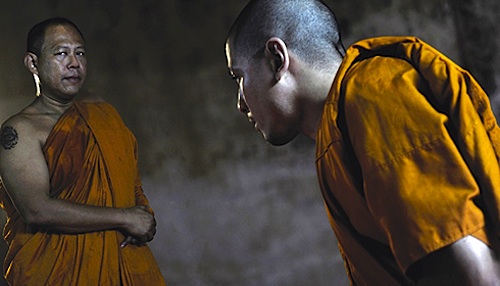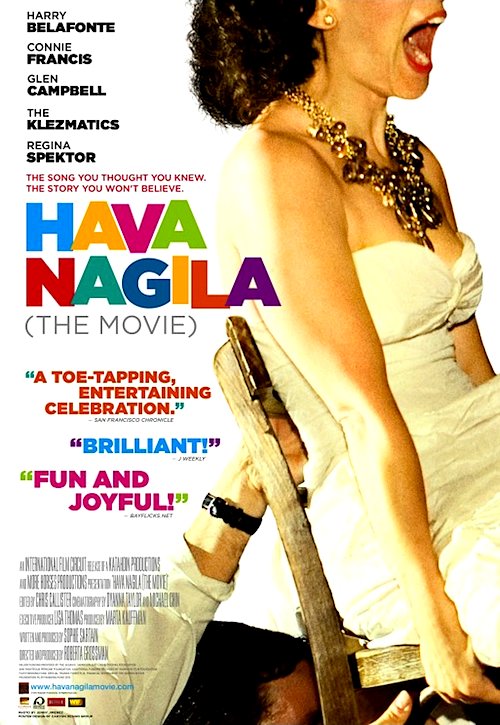 By Joe Bendel. Father Ananda is sort of like a Buddhist Father Brown, except he has more first-hand knowledge of the criminal element. The former police detective intended to lead a peaceful existence as a monk, but homicide has followed him into the monastery in Tom Waller’s Thai mystery Mindfulness and Murder (trailer here), which screens this Saturday night as part of the 2013 International Buddhist Film Festival Showcase in the Bay Area.
By Joe Bendel. Father Ananda is sort of like a Buddhist Father Brown, except he has more first-hand knowledge of the criminal element. The former police detective intended to lead a peaceful existence as a monk, but homicide has followed him into the monastery in Tom Waller’s Thai mystery Mindfulness and Murder (trailer here), which screens this Saturday night as part of the 2013 International Buddhist Film Festival Showcase in the Bay Area.
Father Ananda is a man to be reckoned with, but he had his reasons for leaving the job, as viewers learn over the course of the film. When one of the boys in his monastery’s youth shelter program is murdered, the Abbott asks Ananda to investigate. He will not be getting in the way of the cynical Inspector Somchai, who closes the case half an hour after responding to the call. It turns out the late Noi was a hard kid to love, who was reportedly involved in the narcotics trade. Perhaps he was not the only one. Father Ananda soon uncovers rumors of drug-dealing monks and undercover narcs. Suddenly, a person or persons unknown have taken an unwelcome interest in Father Ananda and his temple boy assistant Jak.
Mindfulness is one of the most picturesque murder mysteries you are likely to see anytime soon. Cinematographer Wade Muller exploits the exotic backdrop for all its worth. Similarly, the monastic setting adds unusual wrinkles to whodunit. Solving the case is not merely a matter of earthly justice for Ananda. There are implied karmic implications for the monastery.
Arguably, Mindfulness is rather a bold selection for the IBFF showcase. There is the clear suggestion it is not unheard of for less savory individuals to adopt monks’ robes as a means of gaming the system. Its portrayal of the Thai justice system is also far from flattering. Yet, there is no denying the virtuous nature of Father Ananda or the appeal of Vithaya Pansringarm’s quietly engaging performance. They are an actor-character tandem worthy of a franchise.
The supporting cast is a somewhat mixed bag, but Ahbijati “Meuk” Jusakul is nicely hardboiled as Somchai, while American-born Prinya Intachai has his moments as Brother Satchapalo, the instant prime suspect. For a random bit of celebrity, former Miss Universe Natalie Glebova (currently based in Thailand) also briefly appears as herself.

Waller’s tempo is hardly break-neck, which has its pros and cons. Although it might be limiting for genre fans, the meditative tone perfectly suits the hero and setting. Indeed, watching Father Ananda struggle with the demands of the spiritual and worldly is fascinating (more than even the crime story itself). Recommended for those who enjoy cerebral mysteries, Mindfulness and Murder screens Saturday night (3/2) at the Smith Rafael Film Center, as part of this year’s IBFF Showcase in the Bay Area.
During the Showcase, patrons will also be inspired by Dafna Yachin’s Digital Dharma, documenting the efforts of American academic E. Gene Smith to digitize and preserve the sacred and secular texts of Tibet. Further noteworthy selections include Victress Hitchcock’s When the Iron Bird Flies, a provocative exploration of the Tibetan Buddhism’s surprising international growth during its unfortunate period of exile, and Naomi Kawase’s visually dazzling yet deeply humane Mourning Forest. Check their website for times and venues here.
LFM GRADE: A-
Posted on February 27th, 2013 at 9:27am.
